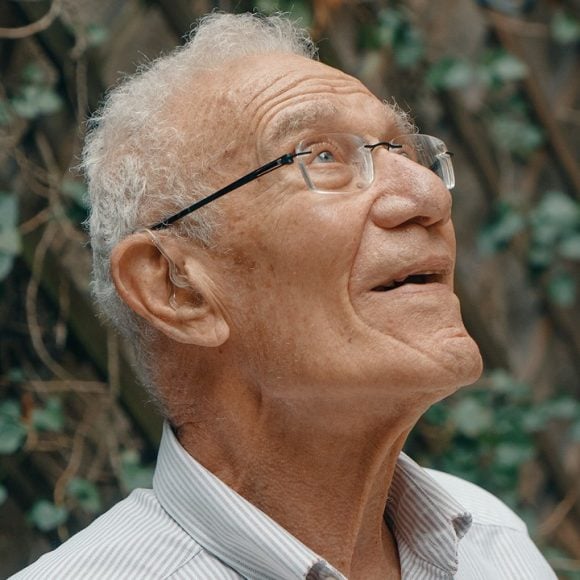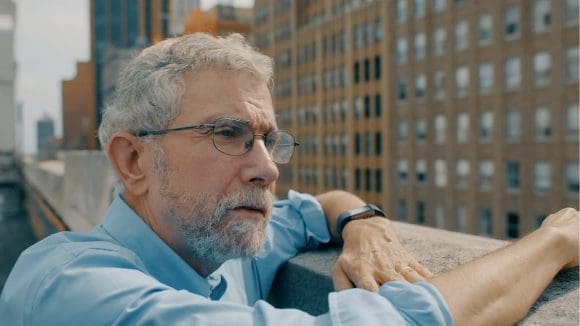There’s only one Bob Solow, founding father of neoclassical growth theory. It’s a field almost all economists have worked in since 1945. He belonged to a small group of outstanding scientists considered to be the greatest of their time, who shaped the profession unlike any other group. For half a century, Solow was a professor at MIT, always leaving his office door open, encouraging young people to talk to him. His work is extraordinary, as is his one-in-a-million attitude, being gracious, warm and eloquent as ever at the age of 92.

Robert Solow
Robert Solow
Sveriges Riksbank Prize in Economic Sciences in Memory of Alfred Nobel, 1987
At a glance
Born: 1924, New York, USA
Field: Macroeconomics, growth theory
Prize-winning work: Contributions to the theory of long-term macroeconomic growth
Eureka moment: Wrote down the final thought he needed for his growth model while lying on the waiting room floor of a pediatrician
An immigration officer’s work: The family name was changed from Soloveychik, meaning 'little nightingale' to Solow, which means nothing at all
One love: Married his childhood sweetheart Barbara, 'Bobby,' after returning from the army and stayed by her side until her death in 2014
A lifetime solving economic conflict
A lifetime solving economic conflict
It’s hard to believe that the person entering the conference room at the Russell Sage Foundation in Manhattan, wearing a light-colored shirt and a smile, is a day over 80. The famed professor admits his hearing isn’t what it used to be, nevertheless, he’s eager to start talking and sharing insights into his work and his thoughts on ongoing economic conflicts.
What motivated Robert Solow to investigate why some economies grow faster than others?
What motivated Robert Solow to investigate why some economies grow faster than others?
After Solow returned home from Europe after World War II, he resumed his studies at Harvard University. It was his wife Bobby, studying economics herself, who got him interested in the field. He soon started working on one question in particular. Why do some economies grow faster than others? Solow explains how it was a natural question for him being a child of the Great Depression. "I wouldn’t say that we were deprived or terribly poor or hungry, ever," he says. "But I was always conscious that my parents were worrying whether they could survive economically. The depression was part of the background of my life."
Why some economies grow faster than others
Has this question inspired you?
Get the latest Nobel perspectives delivered to you.
What is the key to economic growth?
What is the key to economic growth?
In the 1950s, the story of economic growth was a story about capital. “Most economists thought the key was the accumulation of capital, the slow process of saving, of investing and building,” he says.
With half a century’s worth of US statistics at hand, Solow established a simple theory. He designed a mathematical model to work out what increases output in a developed economy. "It turned out that by far the largest contribution came from something that can’t be explained by population growth, a labor supply increase or a growing stock of equipment,” he said. “The largest contribution comes from technological innovation.” Solow showed that the key to sustained growth is a country’s ability to create, absorb and use new technology.
Many developed countries today face slow productivity growth, if any, giving Solow’s core research questions renewed significance.
In the long term we know the only way to get sustained faster growth is to have sustained faster technological progress.
Will unemployment rise due to technological progress?
Will unemployment rise due to technological progress?
“One of the great fears of mankind since the Industrial Revolution has been the fear that technology would create massive unemployment that could not be eliminated,” he said. “It has been the other way. The advance of technology has meant more jobs.”
This is Solow back in 1989, two years after his growth model had earned him the Nobel Prize. Has his opinion changed? Solow shakes his head, carefully weighing his words. "For the advanced economies, technology hasn’t created an unemployment problem,” he says. “The unemployment rate has no trend, if anything it’s a little lower than it used to be.”
Will technology create massive unemployment?
Will technology create massive unemployment?
Solow believes that it will be a while yet before robots take over. "Maybe in the economy of 2117, income from wages and salaries won’t be more than 10 or 15 percent of all incomes,” he said. “Then we have to find another way of providing income, that’s all. This may be difficult, but it’s not inconceivable."
He adds how it’s not a "biological necessity" to base your identity on your job, though many people today feel it’s an important part of it. Perhaps in 20 years, people will discuss what they actually do with their time at dinner parties, rather than what their job titles are.
How should society respond to technological change and its impact on workers?
How should society respond to technological change and its impact on workers?
"Any rapid technological change creates winners and losers amongst workers," Solow says. "There’s no law of economics that says that it’s impossible for the robots to do more and more, better and cheaper. Maybe in a hundred years, we’ll all be taking care of each other rather than producing goods and services, the robots will be doing that. Let them."
He believes that a well-functioning society will find ways of providing for people who lose their income due to technological change. He has always argued that it’s a society’s responsibility to provide education for everyone and that this is truer than ever before. "We have no idea what kind of skills you’ll need,” he says. “But I think the more you know, the easier it is to adapt."
Will human beings still work in the distant future?
What is the importance of education in society?
What is the importance of education in society?
Solow emphasizes how education is not the solution to every problem but that an educated population is necessary for societies to progress. As a professor of economics, he’s spent nearly 50 years at MIT. He reminiscences how much he loved teaching and helping young people discover what they wanted to do in life. Clearly, he was successful. The long list of his doctoral students includes Nobel Laureates George Akerlof, Peter Diamond and Joseph Stiglitz.
How education can be the solution to future challenges
Silicon Valley - a benefit or a threat?
Silicon Valley - a benefit or a threat?
Since he’s the economist who famously linked productivity growth to technological innovation, it’s easy to assume Solow is a great supporter of Silicon Valley but he has mixed feelings. "Silicon Valley as a source of technological development is a benefit,” he says. “But as a source of very rich people who have silly ideas about society, it can be a threat.”
“If the only way I can improve my standard of living is by making your standard of living worse, we’re not going to get along very well. That has happened already, not dramatically, but it has."
What is the connection between money and political power?
What is the connection between money and political power?
“Wealthy people will want to use this to accumulate political influence,” he says. “It’s a good idea to limit the connection between money and political power."
“What we want to generate is not only more growth, but better shared growth, more inclusive growth,” he says. “Be careful who you vote for!" Solow warns.
Has this question inspired you?
Get the latest Nobel perspectives delivered to you.
Working together for the challenges ahead
Working together for the challenges ahead
When asked what has enriched his own life, Solow’s mind wanders to memories of his late wife and serving in the US army in Italy during World War II. "Most of the important things that get done are achieved by groups, not by individuals,” he says. “They’re done by a group of people working together, I think that’s a very important lesson to learn."
Why do countries have to find better ways to grow?
Hear Michael Spence's view on how countries can grow sustainably while having a long-lasting positive impact.
What does Solow’s work mean for us?
More Nobel Laureate stories
Has this question inspired you?
Get the latest Nobel Perspectives updates delivered to you.



